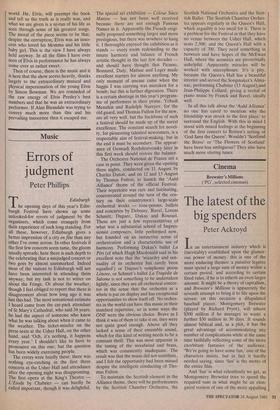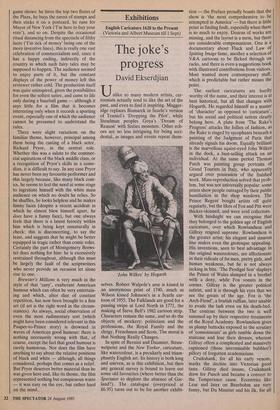Cinema
Brewster's Millions (PG', selected cinemas)
The latest of the big spenders
Peter Ackroyd
In an entertainment industry which is (inevitably) established upon the glamor- ous power of money, this is one of the more enduring themes: a putative legatee must spend a large sum of money within a certain period, and according to certain fixed rules, if he is to inherit an even larger amount. It might be a theory of capitalism, and Brewster's Millions is apparently the seventh attempt to bring it to life upon the screen: on this occasion a dilapidated baseball player, Montgomery Brewster (played by Richard Pryor), will inherit $300 million if he manages to waste a further $30 million in 30 days. It sounds almost biblical and, as a plot, it has the great advantage of accommodating any number of complications while at the same time faithfully reflecting some of the more exorbitant fantasies of the audience: 'We're going to have some fun,' one of the characters insists, but in fact it hardly needed saying, since `fun' is the motto of the entire film.
And `fun' is what relentlessly we get, as Montgomery Brewster tries to spend the required sum in what might be an elon- gated version of one of the more appalling game shows: he hires the top two floors of the Plaza, he buys the rarest of stamps and then sticks it on a postcard, he runs for Mayor of New York (I'm here to buy your vote'), and so on. Despite the occasional ritual distancing from the spectacle of filthy lucre (`I'm sick of money' being one of the more inventive lines), this is really one vast celebration of commercialism and, since it has a happy ending, indirectly of the country in which such fairy tales may be supposed to happen. The audience seemed to enjoy parts of it, but the constant displays of the power of money left this reviewer rather cold. The production itself was quite uninspired, given the possibilities for even the softest satire, and came to life only during a baseball game — although it says little for a film that it becomes interesting only when it records a sporting event, especially one of which the audience cannot be presumed to understand the rules.
There were slight variations on the familiar theme, however, principal among them being the casting of a black actor, Richard Pryor, in the central role. Whether this was a salute to the commer- cial aspirations of the black middle class, or a recognition of Pryor's skills as a come- dian, it is difficult to say. In any case Pryor has never been my favourite performer and this largely because, like many black com- ics, he seems to feel the need at some stage to ingratiate himself with the white mass audience on which no doubt he relies. So he shuffles, he looks helpless and he makes funny faces (despite a recent accident in which he almost blew himself apart, he does have a funny face), but one always feels that there is a latent ferocity within him which is being kept unnaturally in check: this is disconcerting, to say the least, and suggests that he might be better equipped in tragic rather than comic roles. Certainly the part of Montgomery Brews- ter does nothing for him: he is excessively restrained throughout, although this must be largely the fault of the scriptwriters who never provide an occasion let alone rise to one.
Brewster's Millions is very much in the style of that 'zany', exuberant American humour which can often be very entertain- ing and which, after dint of constant repetition, has now been brought to a fine art (if art is the right word in the circum- stances). As always, social observation of even the most rudimentary sort (which might have been considered relevant in this Pauper-to-Prince story) is drowned in waves of American good humour: there is nothing necessarily wrong with that, of course, except the fact that good humour is rarely humorous. Nor does the film have anything to say about the relative positions of black and white — although, all things considered, perhaps that comes as a relief. But Pryor deserves better material than he was given here and, like its theme, the film represented nothing but conspicuous waste — it was easy on the eye, but rather hard on the mind.











































 Previous page
Previous page